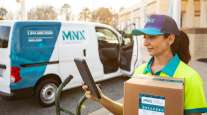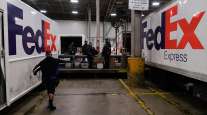UPS to Buy Coyote Logistics

UPS Inc. expanded its domestic supply chain capabilities by agreeing to buy truckload broker Coyote Logistics for $1.8 billion, as purchases of fast-growing logistics companies accelerate.
Private equity company Warburg Pincus is selling Coyote, which generated $2.1 billion in sales and $255 million in net revenue last year after growing revenue 50% for five straight years.
“This high-quality acquisition significantly increases UPS’ full-truckload scale, and we are uniquely positioned to take advantage of exciting new revenue growth and synergy opportunities,” said CEO David Abney, who heads UPS, which ranks No. 1 on the Transport Topics Top 100 list of the largest U.S. and Canadian for-hire carriers and on the Transport Topics Top 50 list of the largest logistics companies in North America.
UPS’ move is the latest in logistics consolidation this year as major players pursue new markets. The largest deal included rival FedEx Corp., which offered nearly $5 billion for Dutch package operator TNT N.V. in April. FedEx, No. 10 on the TT Logistics 50 and No. 2 on the for-hire TT100, also bought U.S. logistics operator Genco this year.
Including UPS and FedEx, five of the 13 largest companies on the TT Logistics 50 have pursued acquisitions. The others are No. 4 C.H. Robinson Worldwide, No. 12 XPO Logistics and No. 13 Kuehne + Nagel.
“UPS has put a stake in the ground saying, ‘Don’t forget about us,’ ” said Thom Albrecht, a BB&T Capital Markets analyst who believes the company will continue to be prominent as sector consolidation continues.
“This deal makes sense strategically,” said Evan Armstrong, president of logistics consulting firm Armstrong & Associates. “UPS has very good global transportation management skills. It lacked Tier 1 domestic transportation management skills, which Coyote brings.”
Chicago-based Coyote ranks No. 39 on the TT Logistics 50, generating 83% of its revenue from dry van and reefer freight, with food and beverage as its largest customer group. Its CEO, Jeff Silver, will stay on the job and report to Alan Gershenhorn, UPS’ chief commercial officer.
“The Coyote management team is very excited to become a part of UPS and continue to grow, now with UPS’ support,” Silver said.
UPS, based in Atlanta, identified synergies of $100 million to $150 million annually through better use of purchased transportation and backhauls, as well as new opportunities to cross-sell the companies’ services.
One potential opportunity is added flexibility during peak season, after two years when UPS has struggled to match capacity and demand.
The deal could be “just the injection needed for UPS to turn the corner on delivering better peak performance,” Credit Suisse analyst Allison Landry said.
She cited “a potentially powerful trend, whereby full truckload and LTL have become important conduits for eCommerce supply chain management.”
Armstrong identified another opportunity. UPS can link the international portion of freight managed in its Supply Chain unit with Coyote’s U.S. domestic services, he said, to take advantage of higher domestic profits at a time when ocean freight margins are squeezed by low freight rates.
Views varied on how well the companies would mesh.
Describing the pairing as “very strange,” Albrecht said that UPS’ expectation of leveraging Coyote’s truckload capacity makes sense but is “easier said than done” because some Coyote carriers may not want to haul for “very demanding” UPS.
“Big Brown is a fairly buttoned-down operation,” Armstrong said. “Coyote has a freewheeling, entrepreneurial culture. UPS has said they are not going to change things at Coyote. If they don’t paint it brown, and let it run as it is, it should come out very well.”
Asked about corporate culture, UPS spokesman Steve Gaut told TT that the company “expects that Coyote will continue to be located at its current sites, maintain its current leadership and employee workforce, and will continue to develop its strong and distinct culture.”
Ben Hartford, a Robert W. Baird & Co. analyst, doesn’t envision clashing cultures.
“Founder Jeff Silver’s commitment to remain with the company is critically important to the transaction’s success,” he said, as well as the fact that both companies have robust and complementary information technology systems.
The effect on the Teamsters union, which represents about 250,000 UPS workers, isn’t certain.
“We don’t think the Teamsters will be thrilled to see potential union freight being hauled with nonunion carriers,” Albrecht said.
“If we are successful in selling these empty backhaul and repositioning routes, the company and Teamsters drivers and crew stand to benefit by having more revenue-producing loads,” Gaut said.
Spokesman Galen Munroe said the union had no comment on the acquisition.
UPS offers brokerage as part of about $300 million in truckload service lodged inside UPS Freight. Brokerage statistics aren’t disclosed. The company’s second-quarter net income was $1.23 billion, or $1.35 per share, on revenue of $14.1 billion.
Coyote’s place in the organizational structure hasn’t been decided because the acquisition isn’t completed.
“Opportunities [for consolidating businesses] will be evaluated, but only after closing,” Gaut said.
UPS expects closing within 30 days of the announcement, paying with cash and debt. It said Coyote will add to earnings next year, but the profit benefit wasn’t announced.




